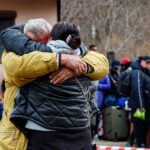Background: Bereaved individuals who have lost a loved one under traumatic circumstances can develop symptoms of Persistent Complex Bereavement Disorder (PCBD) and/or Posttraumatic Stress Disorder (PTSD). This is particularly common in refugees, as they frequently have been confronted with multiple traumatic losses. For patients with severe PTSD and traumatic grief a treatment programme was developed, embedding individual traumatic grief focused therapy in a group-based multidisciplinary day patient treatment programme. The day patient treatment comprised a weekly five-hour programme consisting of three phases with a duration of four months each. Objective: To evaluate the feasibility and potential effectiveness of the treatment programme. Method: Data were analyzed from 16 participants treated between October 2013 and March 2014. PTSD severity and PTSD/PCBD diagnoses were measured during the initial and final phases of treatment using the Clinician-Administered PTSD Scale for DSM-IV (CAPS) and the Traumatic Grief Inventory Self Report (TGI-SR). One clinical case is presented in more detail. Treatment attendance was also registered and therapist satisfaction was evaluated in a focus group. Results: Thirteen patients (81%) completed the treatment. Each day of the treatment programme was attended by a mean of 76% of the participants. In the focus group, therapists noted symptom reduction in their patients and they therefore regarded Brief Eclectic Psychotherapy for Traumatic Grief (BEP-TG) as an effective therapy for their patients. During treatment, significant decreases in PTSD severity as well as diagnosable PTSD and PCBD were observed. Conclusions: Results support the feasibility and potential effectiveness of the day patient treatment programme for traumatic grief. The programme appears to be particularly suitable for refugees with severe PTSD and PCBD psychopathology, who may not benefit enough from usual care.
The home environment and Asian immigrant children’s early literacy skills
Objective.The current study examines how aspects of the home literacy environment were related to Asian immigrant children’s early literacy skills.Design.One hundred and thirty-nine Asian immigrant

